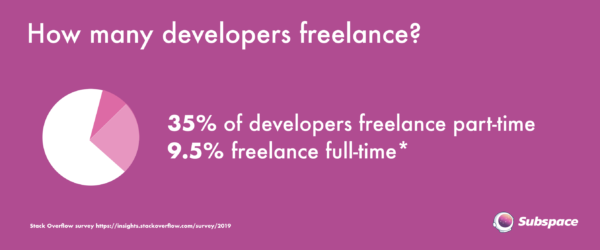— April 23, 2019
Hundreds of millions of people around the world now make their living as freelancers. Over 30% of them are developers. But if the opportunity seems vast, so is the risk.

Almost as many people and companies are trying to profit from the freelance boom as are trying to get into it. Whatever freelancing job site seems too good to be true at this point most certainly is. The biggest freelancing platforms are hiking their fees. Placement agencies are erecting non-compete barriers, and every wannabe guru is selling an online course that promises quick riches.
So how can freelance developers find real clients and make a living? Ignore schemes, keep your costs low, and do what developers do best: Scientifically test channels to discover which ones generate paying clients, then automate your outreach so marketing happens while you sleep.
10 ways to find gigs as a freelance developer
1. Referrals
It’s highly likely that your first client will be a former employer. If someone already knows you and respects your work, that saves you a lot of searching and selling. The same principle applies to existing clients—they probably have friends who need your help, referring you makes them look good, and 77 percent of people are more likely to buy when they heard about you through a recommendation.
You can also set up your own referral networks. Find designers, marketers, and agencies whose clients often need coding help. Find reasons to stay in touch and agree to refer each other business. Whenever you deliver a project that truly excites a client, ask them for the emails of two people they know who also need your help.
2. Messaging groups
Hackerbook, Slack channels like iOS Developers, Ruby on Rails Link, and Larachat
Lots of associations and entrepreneurial groups like incubators and VCs keep slack channels or shared Google Sheets docs for finding and referring employees and contractors. You can’t find the best ones through Google search—they’re a word of mouth only thing, so make lots of friends and always ask other developers how they find work.
Some sites, such as Hackerbook, are discoverable because they’re trying to disrupt the expensive and painful recruiting process. They connect part-time coders to clients for free.
3. Forums
Reddit, Stack Overflow, GitHub
Niche subreddits and LinkedIn groups can be a good place to find work, especially when they’re focused on specific libraries, frameworks, languages, or skill sets. For example, r/JavaScript, r/Frontend, and r/PHP have such straightforward names that hiring managers often stumble across them while looking for developers. Unless the forum encourages it, don’t write a post that says you’re looking for work — so is everybody.
Also, contribute to open source projects in GitHub. It’ll help you burnish your credentials and you’ll meet other developers, who, if you work well together, might be able to refer you work.
4. Create an online course
SitePoint, Skillshare, Udemy, Teachable
Are you great at what you do? Become known for your expertise and impress clients by creating a course. The more specific your course topic, the better. The general stuff has already been done and unless yours is 10x better, plow new ground. Some sites, like Skillshare, provide a built-in audience, which saves you time.
5. Social media
It’s a real long play, but building a reputation somewhere like Reddit, Twitter, or Hacker News can lead to work. It means you’re at the forefront of news in your niche, are first to hear of new opportunities, and build a network of people who celebrate your accomplishments and think to refer you.

6. Work platforms
I’m calling it now: This will be the top category a decade from now. Today, most companies either facilitate connections between businesses and freelancers (UpWork), or provide developer tools so they can write code (GitHub). Work platforms like Subspace do both—they let companies post projects and they pay developers to swarm-build them.
7. Code Bounty Sites
Bountify, Bountysource, HackerOne, company-specific bounty programs
Unless you think you know something nobody else does, be wary of bounty sites. They promise money but create a race where only the winner gets paid. It’s great for clients, but nine times out of ten, they’re a waste.
8. Recruiting agencies
Agencies connect developers to verified clients for a fee. They can be a great, low-effort way to search for high-end clients, but ensure that the client pays the placement fee, not you. They’re also mostly focused on full-time hires, not freelancers.
9. Coding schools
General Assembly, Flatiron School, CareerFoundry, Codeup, FullStack Academy, Ada Developers Academy
Some coding schools help graduates get placed, usually in full-time roles, but possibly in freelance ones. Some, like Codeup, offer scholarships.
10. Freelancing platforms
UpWork, Freelancer, Guru, Gigster
Generalist freelancing platforms are last because they’re the most likely to waste your time. Clients are bombarded with so many proposals that even if you’re a perfect fit, you may be ignored. Here’s my take: Create your profile on a few of them, work a few low cost projects to get your first client reviews, then turn your rates to the max and wait for clients to find you. What happens is that the occasional business gets so frustrated with shoddy work from others that they refine their search for high-cost freelancers. Hopefully, they’ll find you.
It’s a war zone out there. But if you test each channel to see what works, you can learn, earn, level up, and grow your freelance business, despite everyone trying to make a business off of you.
Business & Finance Articles on Business 2 Community
(158)
Report Post






